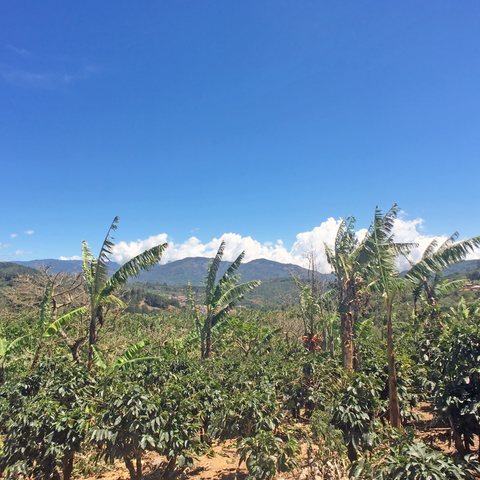
Tarrazú, San Jose Province, Costa Rica
Several hours southwest of the capital city of San Jose, concealed in the Tarrazú region’s vast network of valleys and windmills is the Don Pepe micromill. Though the mill was founded by one Don (an honorary title in Spanish), it is operated by another. Don Cesar Ureña and his two brothers, Martin and Edgar, are currently pushing the boundaries of experimental processing and exotic variety cultivation in the remote region. The Ureñas, their children, and their infamous fleet of trucks are producing some of the finest coffees in Central America, and I was beyond fortunate to witness their ingenuity first hand.

The Ureña brothers are known throughout the specialty coffee industry for their unique fleet of antique work trucks
Most of the varieties currently grown in Costa Rica pass through the mill at some point. The majority of the Ureñas' crops are variations on the catuai variety, from yellow to orange to red. They also have large lots of Villa Sarchi and caturra. Smaller lots include Kenyan varieties and mocha. Cesar’s farms are between 1500m-1900m above sea level, while Edgar’s and Martin’s farms are between 1700m-1900m. These are uncommonly high farms in Costa Rica, which gives the Ureñas a distinct advantage due to the positive effects high elevation has on coffee quality.

The unique variety mocha undergoing the natural process. Mocha has a distinct chocolate-like flavor, hence the name for a drink with espresso, milk, and chocolate
Because of Cesar’s unmatched handiness and strong common sense, Don Pepe uses a handmade wet mill and separation system. Most mills in Costa Rica purchase their wet processing systems for tens of thousands of dollars, but Cesar’s system is just as efficient and effective for nearly 1% of the price. In addition, the mill also recycles its own water, thus creating less waste water and having a much smaller environmental footprint than most wet mills. Because of this, Don Pepe’s processing system is highly adaptive and mobile. The Ureñas cup all of their own coffees to ensure quality control, and, in the spirit of their wet mill, they roast every sample they take from their crops on a DIY, handmade drum roaster.

Don Cesar and his amazing(ly inexpensive), DIY wet mill

A fully functional, homemade drum roaster
Edgar and Martin both specialize in growing and producing natural process coffees. Their naturals spend between 16 and 19 days on drying beds until all of the cherries read between 8-9% water content. Edgar’s farm, Finca La Chumeca, also specializes in experimental fermentation processing. Recently, Edgar hosted a team of agricultural and processing experts from Brazil with the purpose of experimenting with various degrees of light and heat absorption during the controlled fermentation of coffee cherries. I’m very excited to taste the results of their labor… for scientific purposes, of course.

An explanation of water content measurement and analysis
The entire Don Pepe operation is very much a study in boldness. It is difficult to ensure consistent quality in natural process coffee, but the Ureñas continue to process higher percentages of their current crops in this manner. On top of that, they willingly try every kind of process they can with every variety they can get their hands on. Because of this boldness, we are excited to be partnering with the Don Pepe micromilll this year to bring you two of their delicious coffees. We will be blending one of Cesar’s washed coffees and one of Martin’s naturals together to showcase the full spectrum of flavor Don Pepe is capable of. Look for our special edition Deviation Blend in any of our shops or online here.


Leave a comment